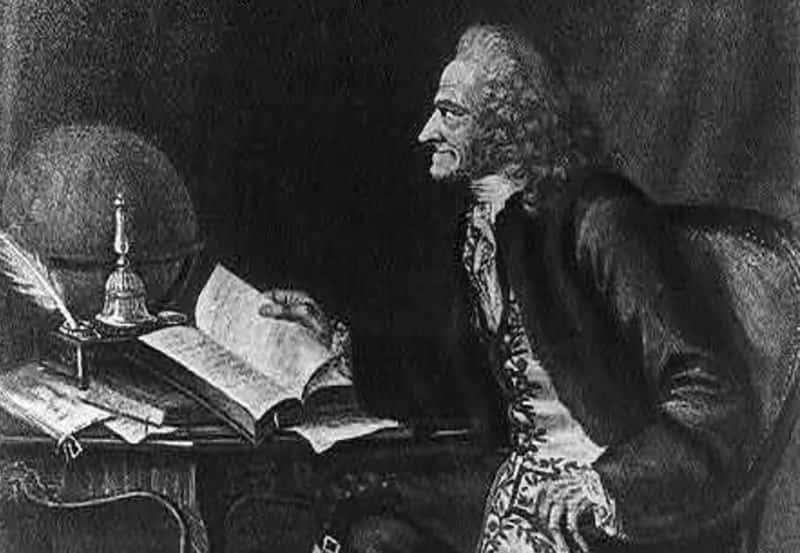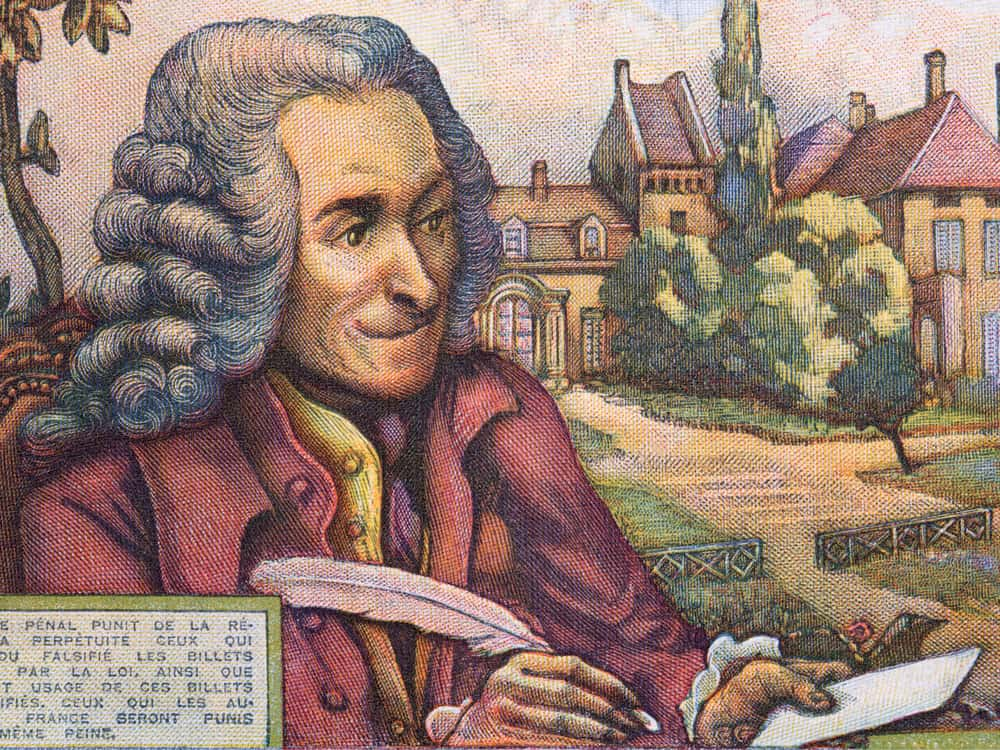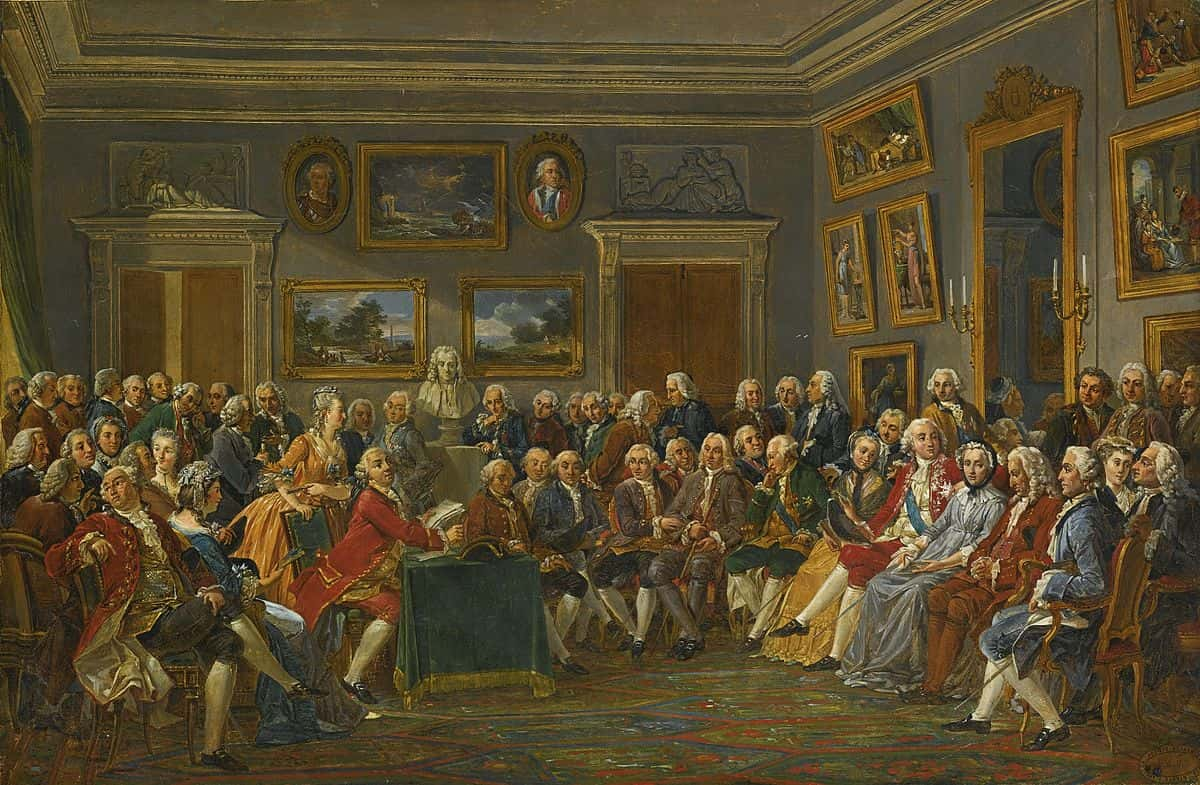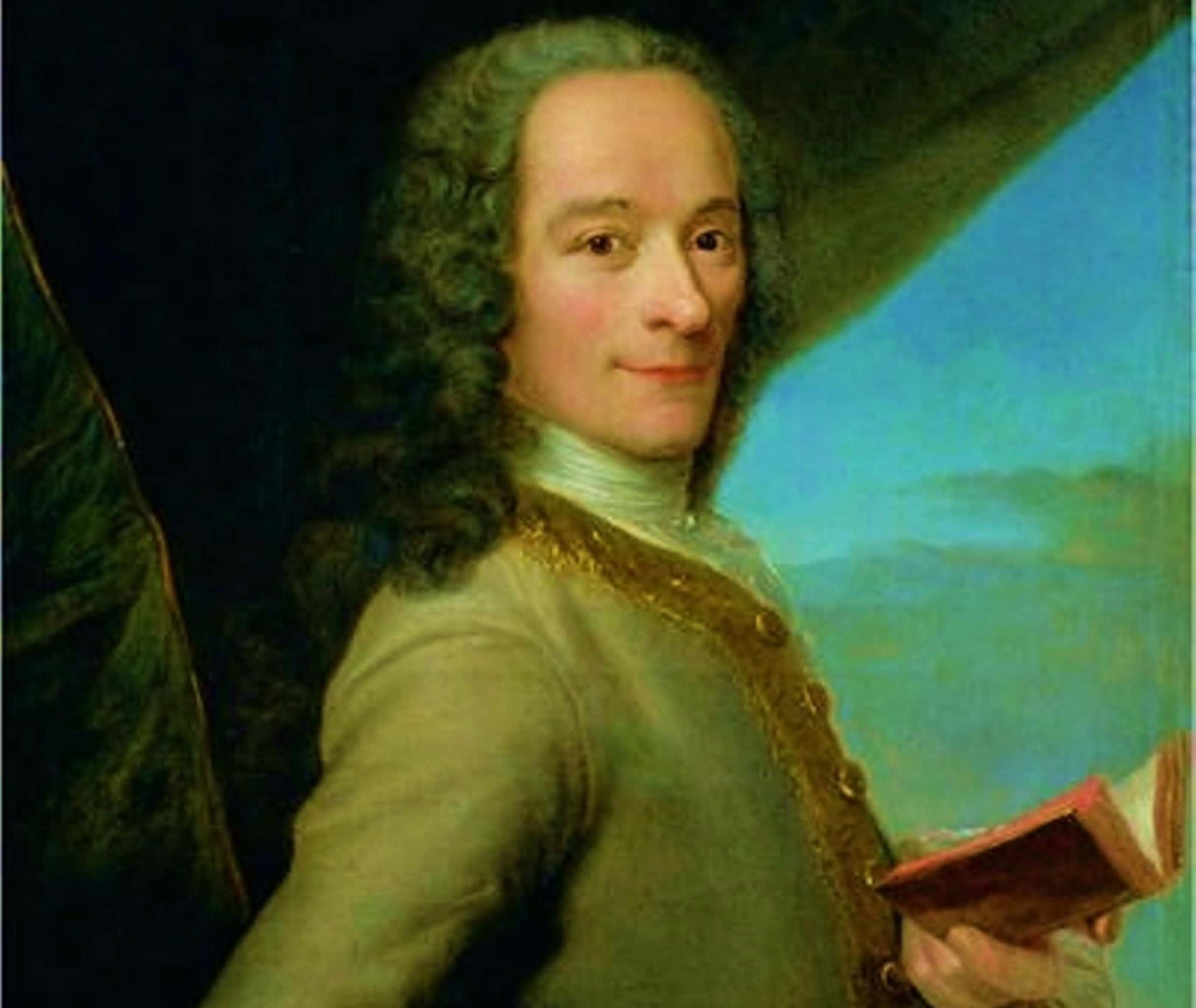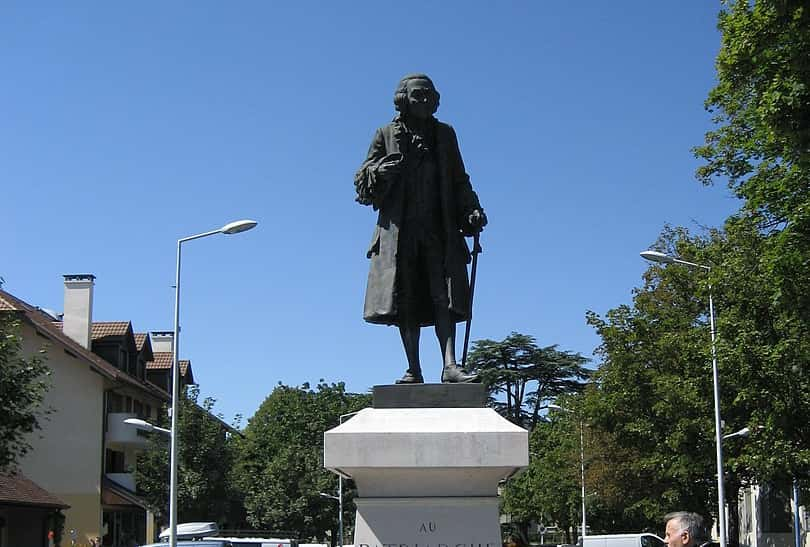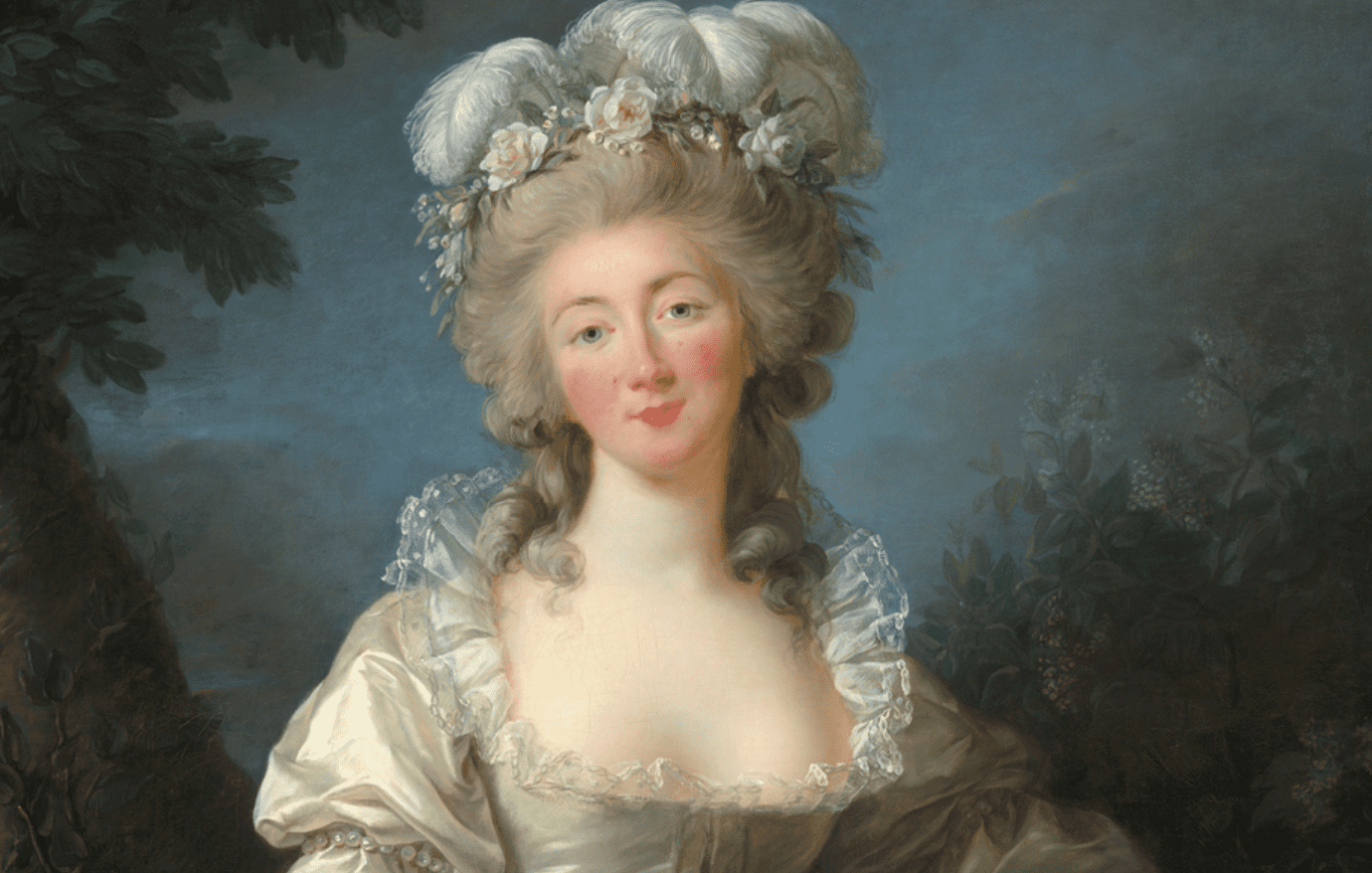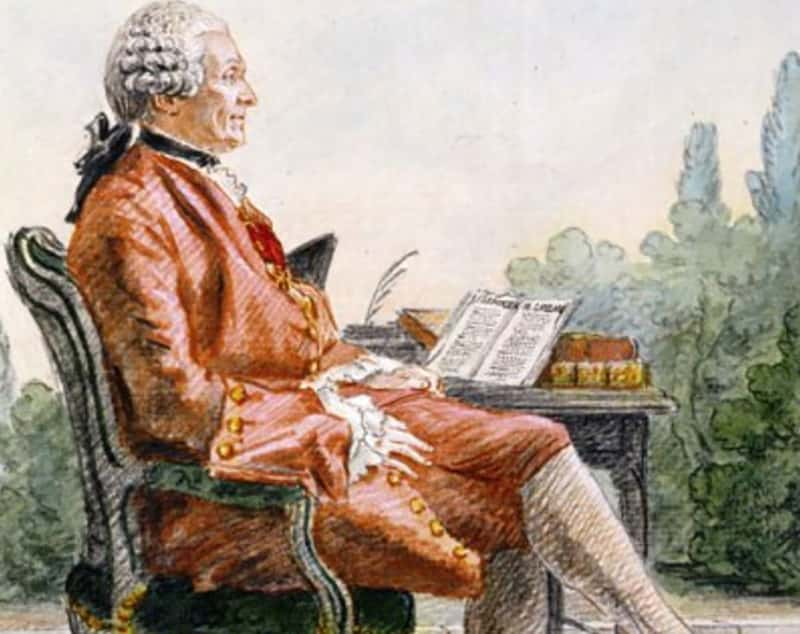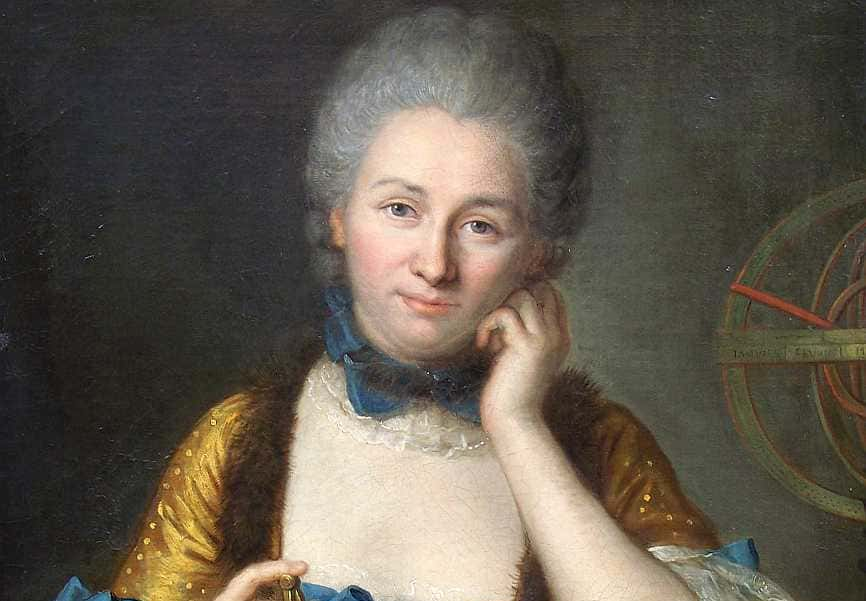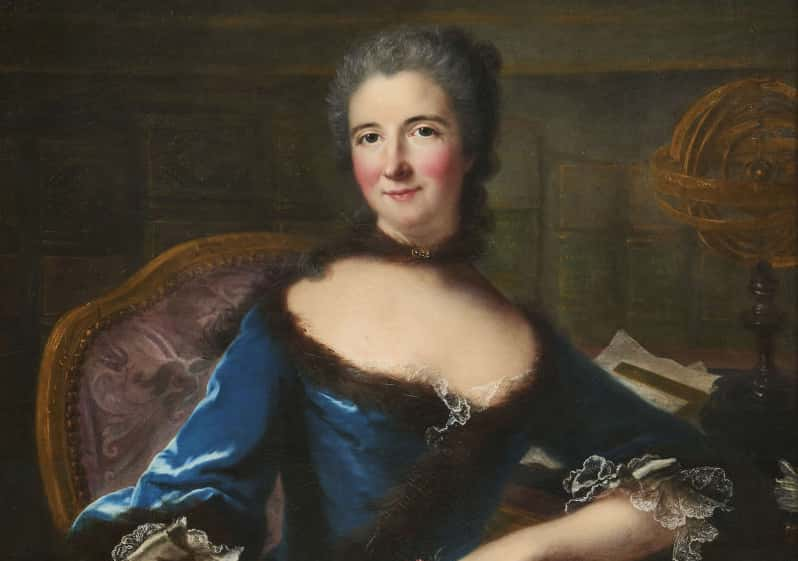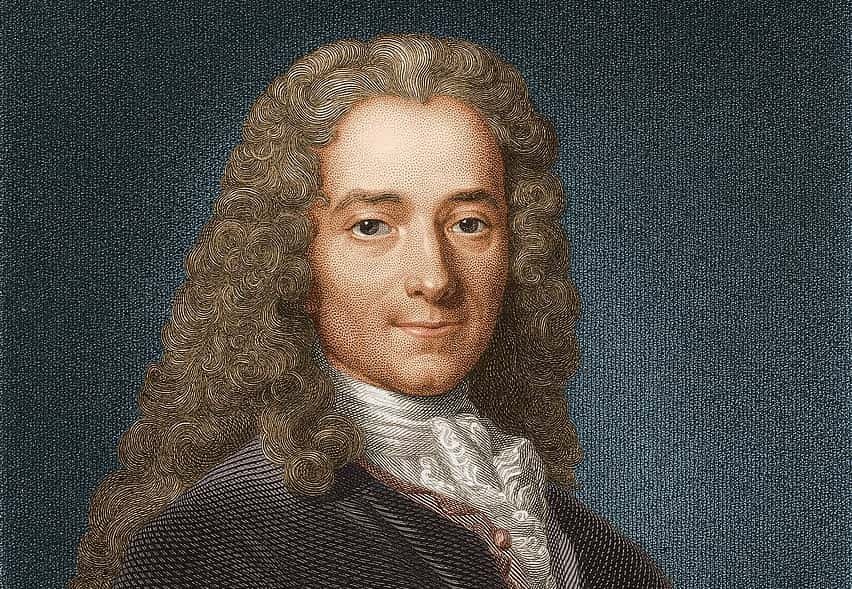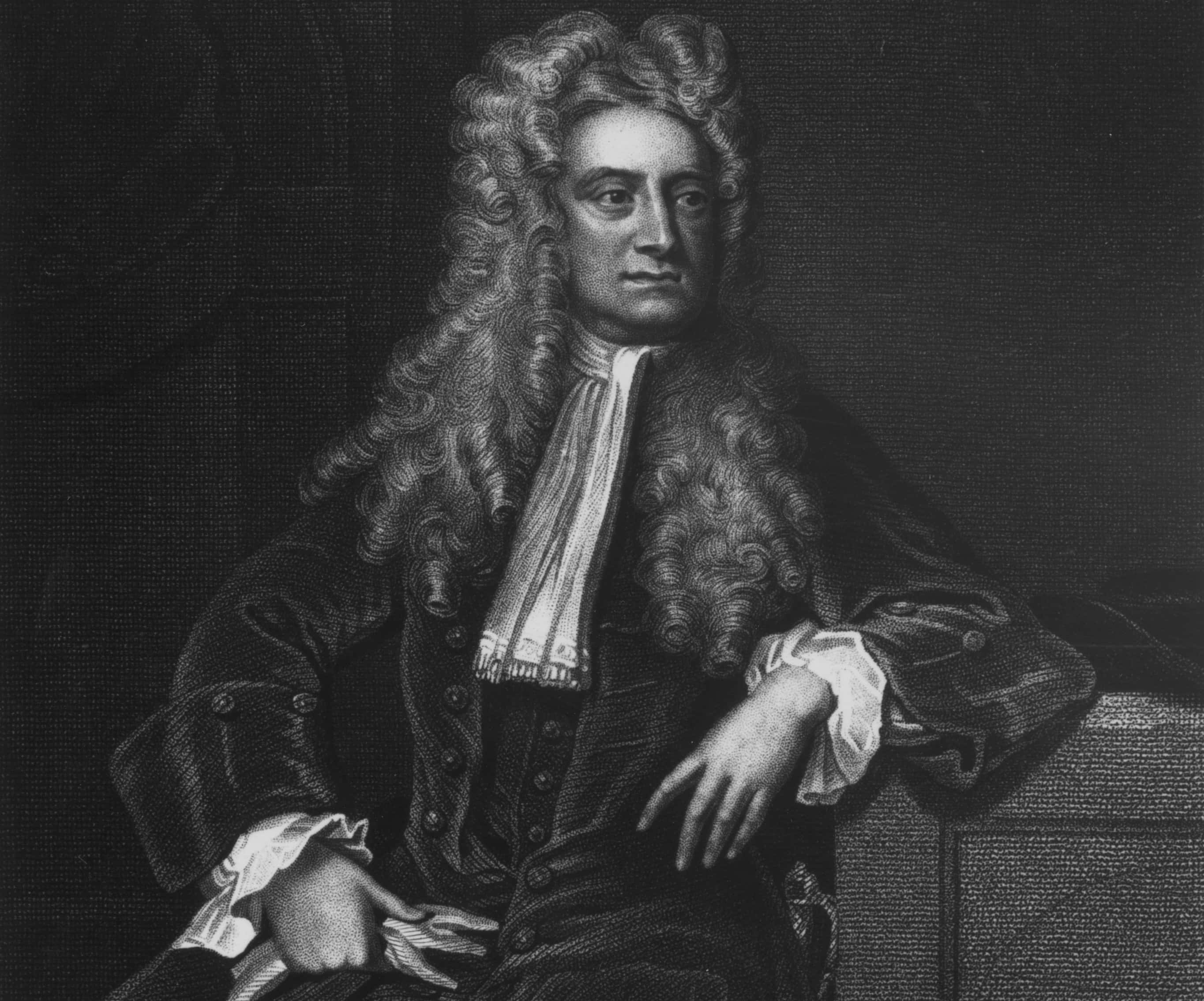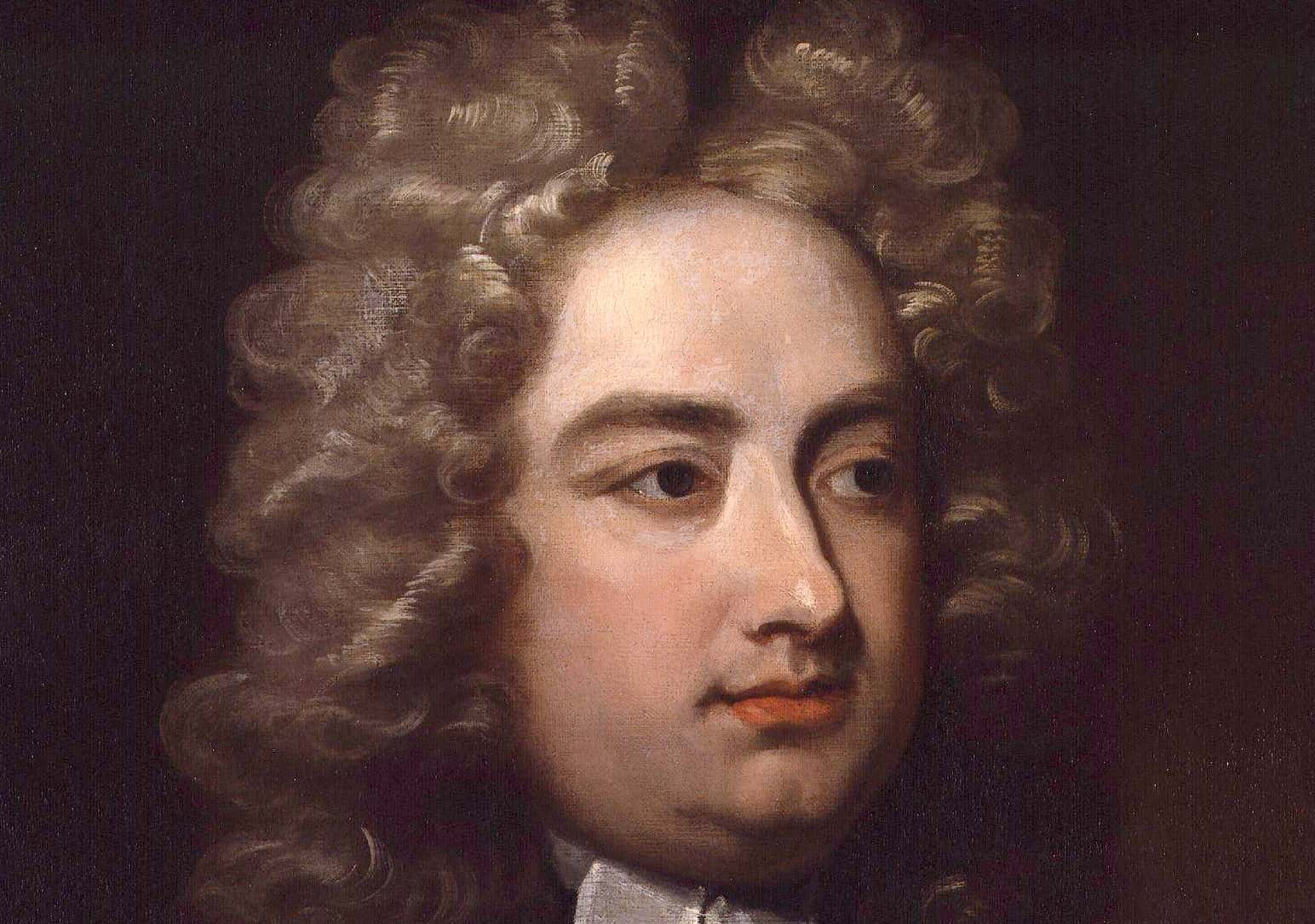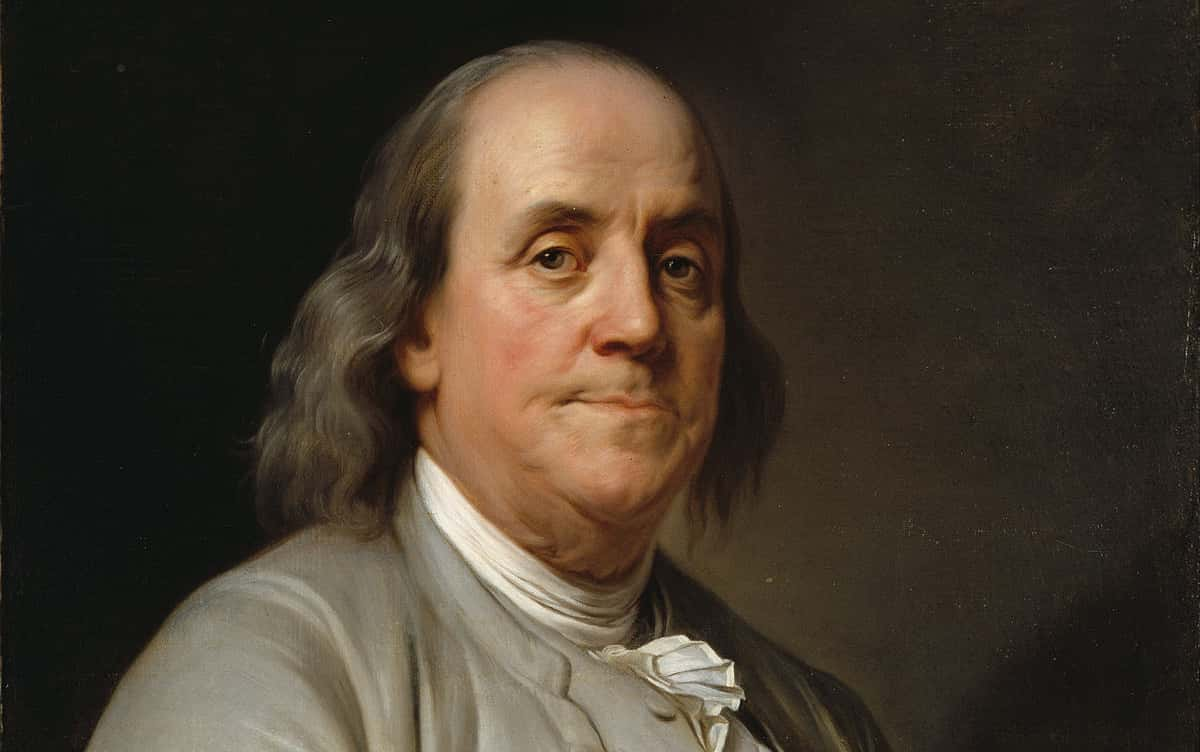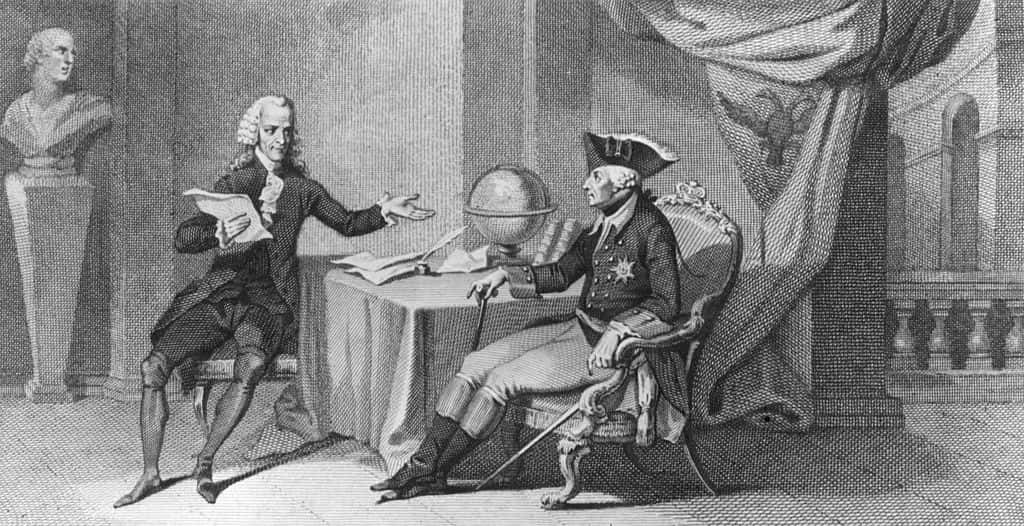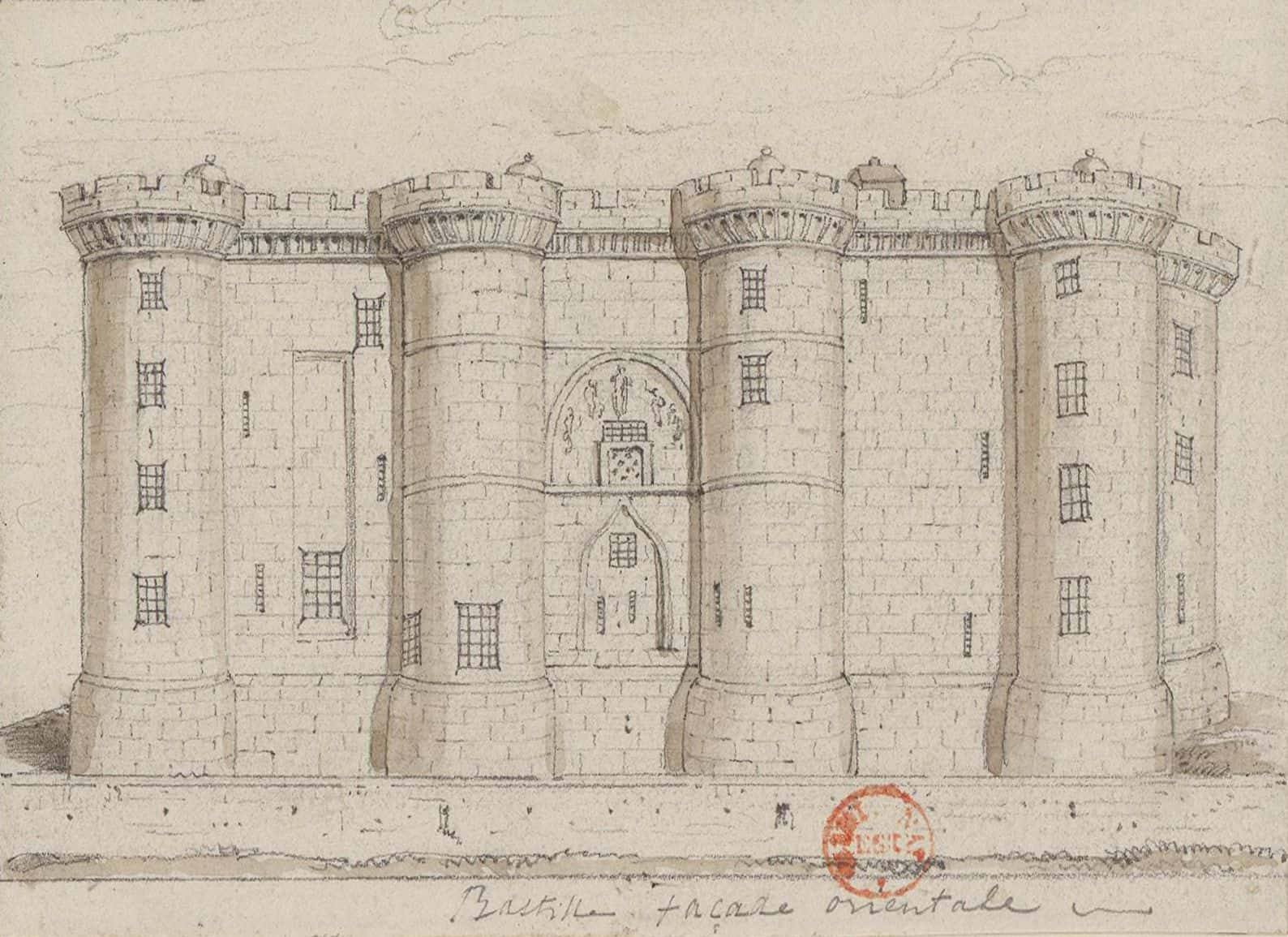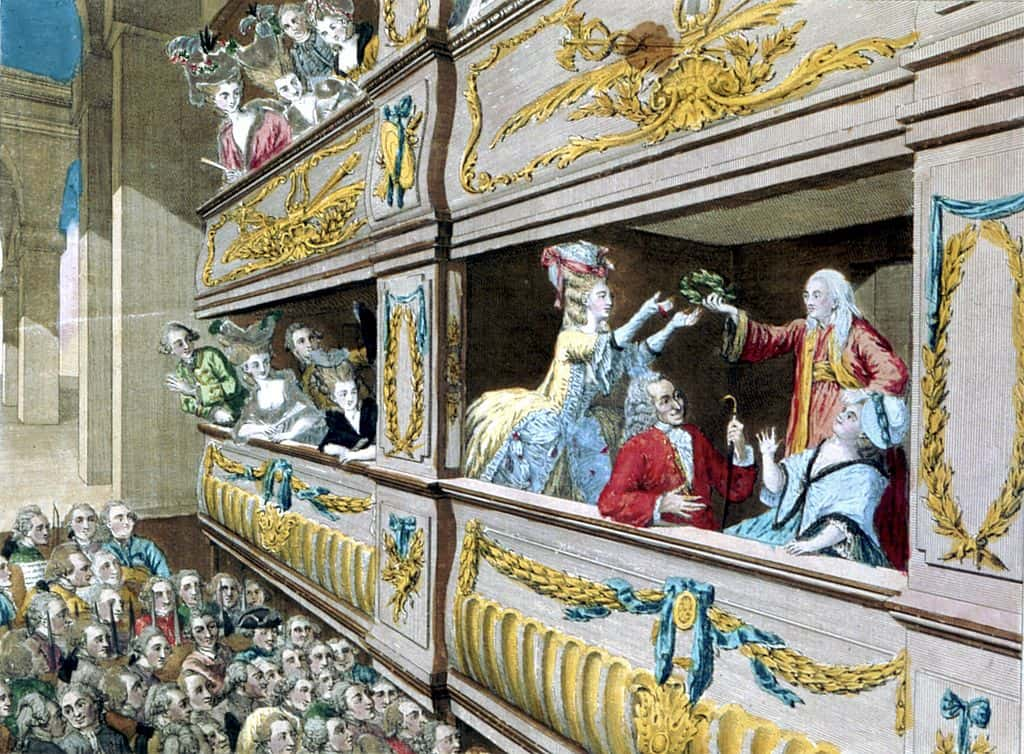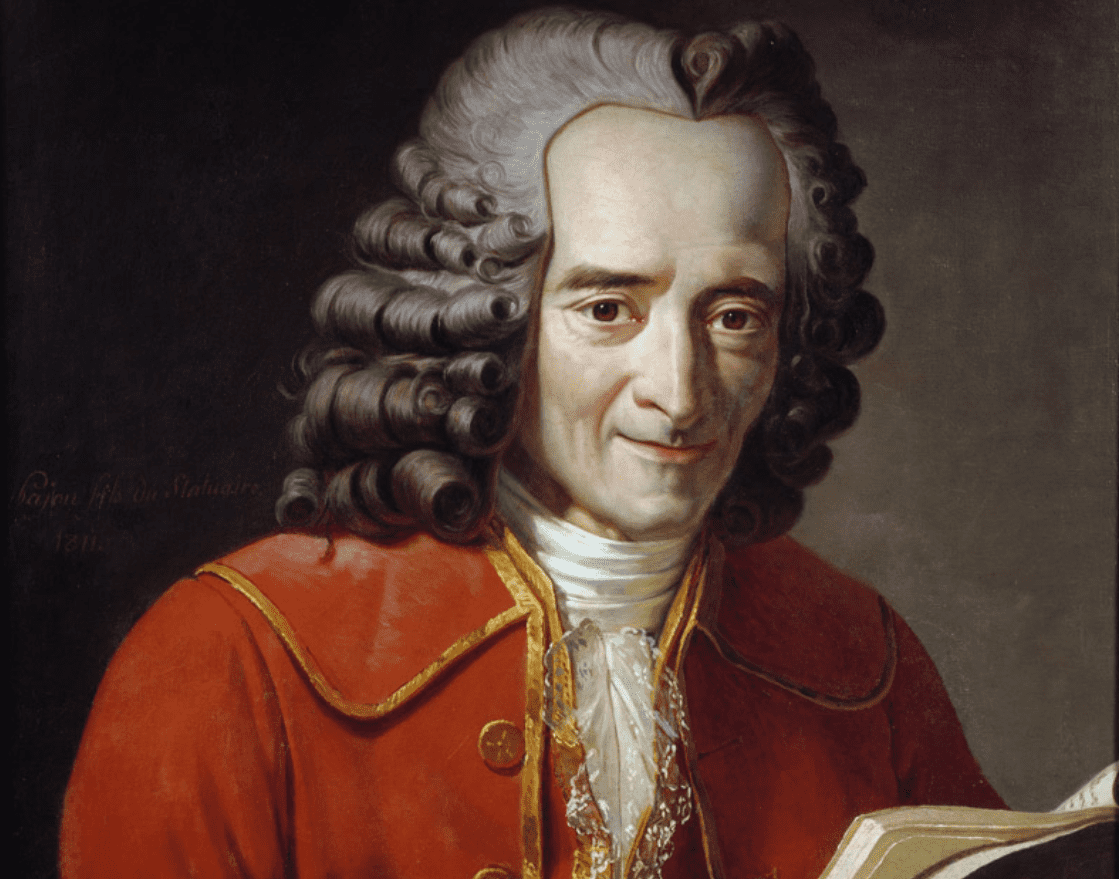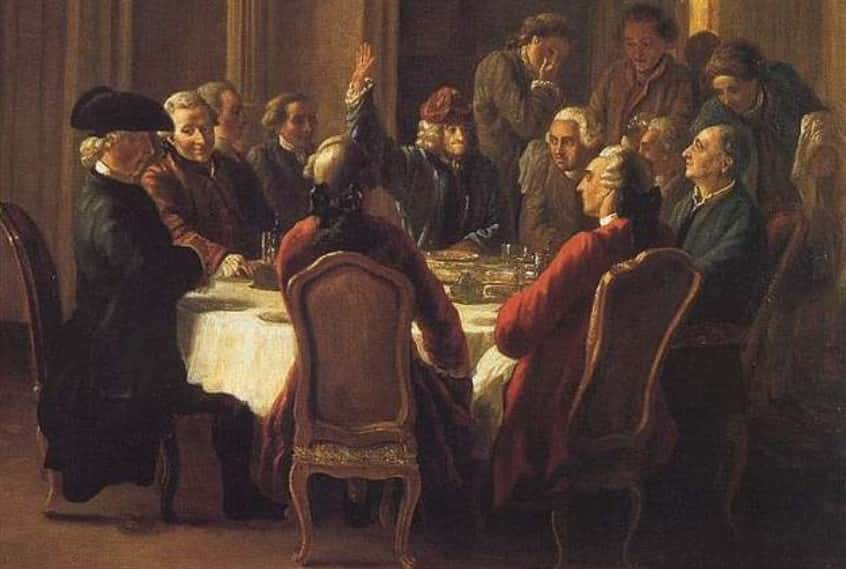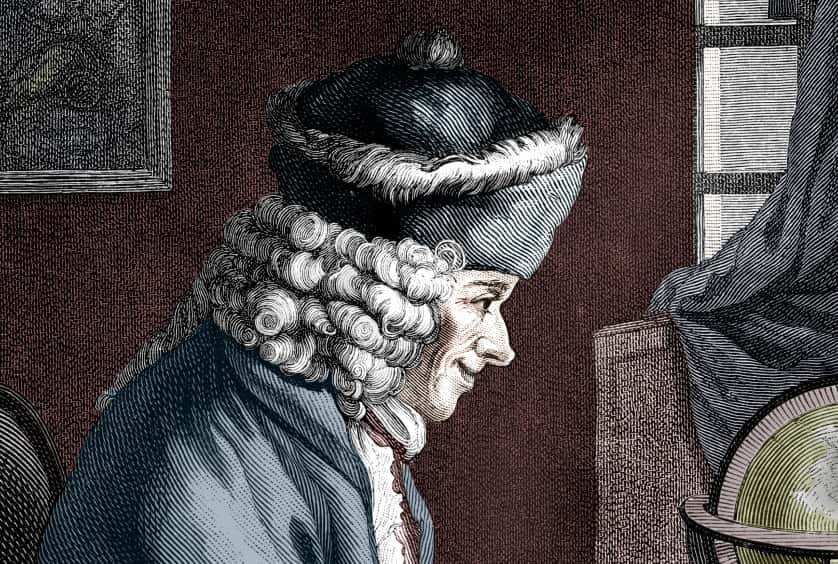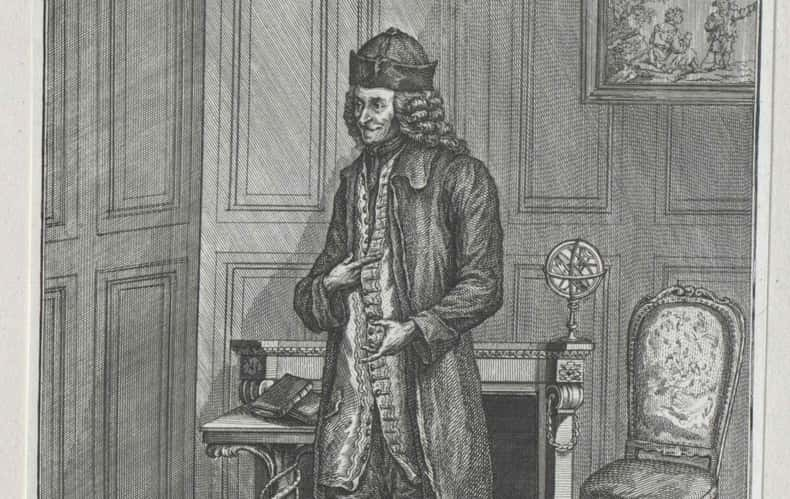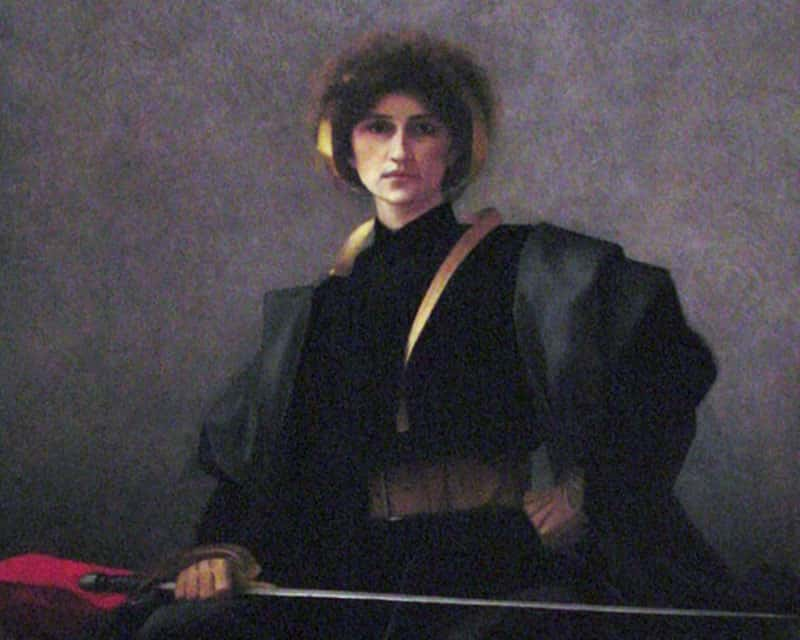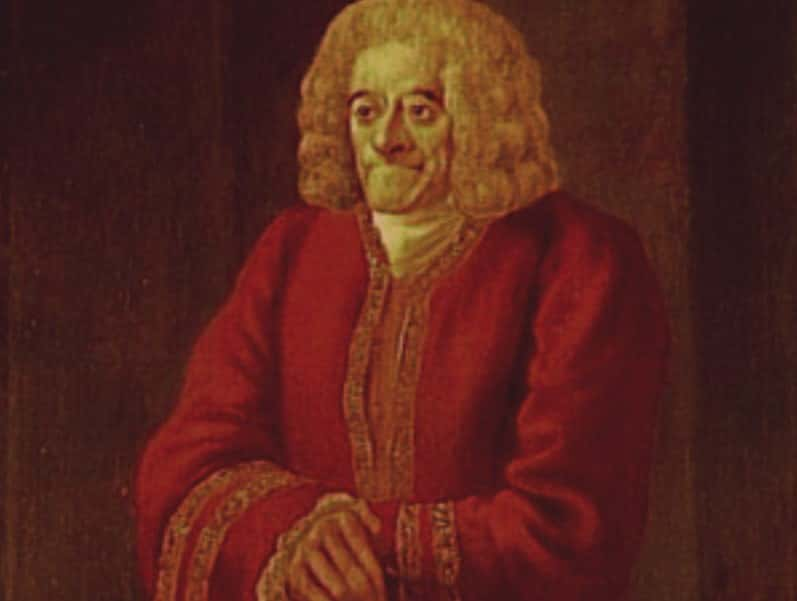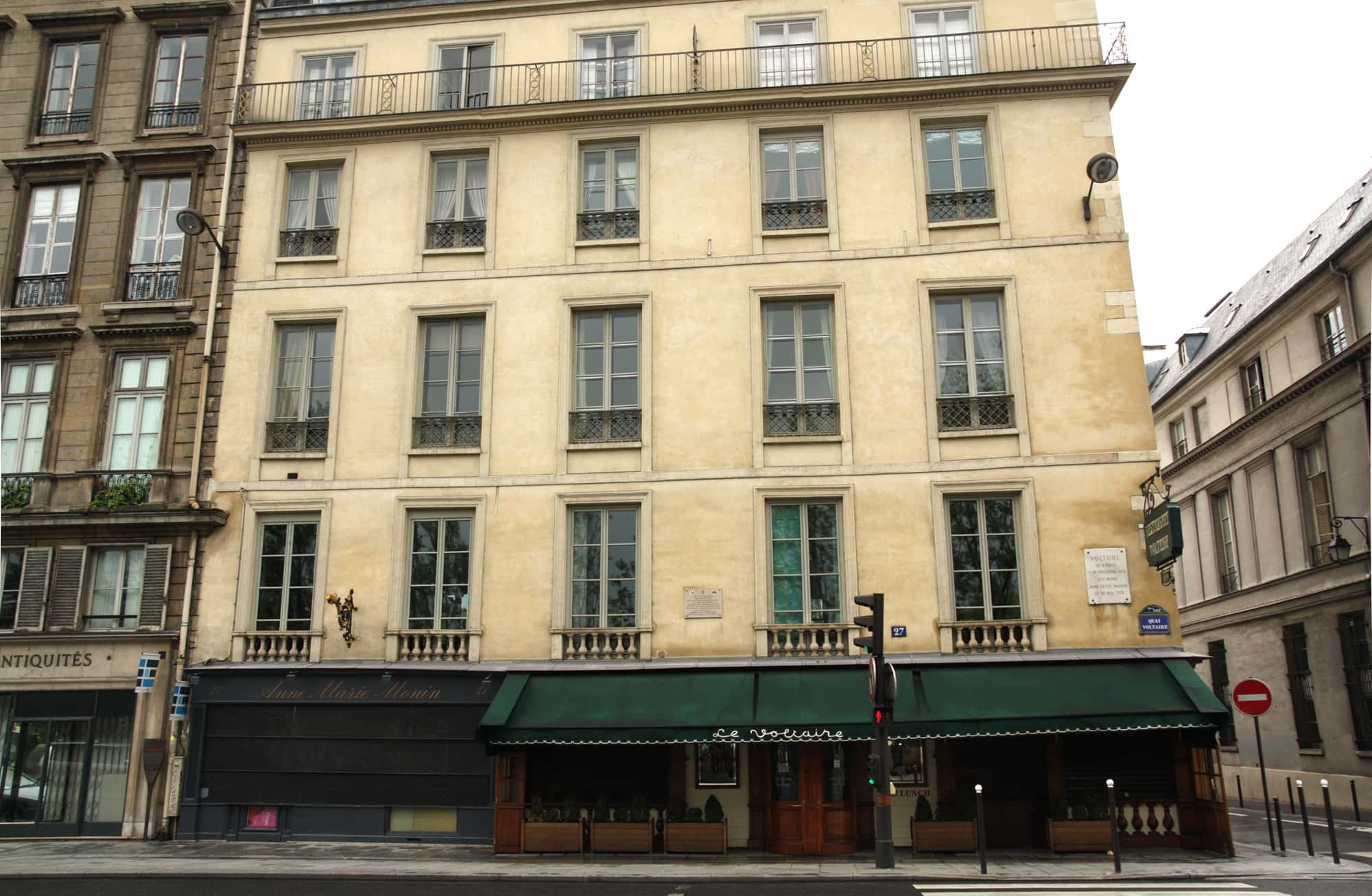One of the greatest writers and philosophers in French history, Voltaire was a man who made the written word his business in all its forms. One of his favorite uses of his craft was to satirize and criticize things or institutions with which he took issue. But his criticisms often drew notice, and it's safe to say that a man ahead of his time like Voltaire would have some misadventures and run-ins with the law. So what is Voltaire’s story? What kind of fights did he pick through his writing? What were his philosophies? And above all else, why should we care about some old French guy? Read these facts to find out more!
1. That’s Not My Name
Known to history as Voltaire, you might be surprised to know that this wasn’t actually his real name. Francois-Marie Arouet took on this nickname in 1718 after he’d been imprisoned for the first time in the famous Bastille prison in Paris (more on that later).

2. Sticking It To The Man
The choice to take on this nickname has been debated amongst scholars, as some believe that he did it to be slightly more anonymous with his writing (though given that we know who he is, that anonymity might not have been very successful…). Another theory is that he was more concerned with abandoning his old name because he was in such disagreement with his father’s beliefs and values.
 Voltaire in Love (2021), France 2
Voltaire in Love (2021), France 2
3. Man Of Letters
Voltaire was an incredibly prolific writer; during his life, he wrote “more than 50 plays, dozens of treatises on science, politics and philosophy, and several books of history on everything from the Russian Empire to the French Parliament". He also found the time to write more than 20,000 letters and an untold amount of poetic verse! Clearly, this was a guy that did not have access to Facebook and YouTube.
4. How Did He Do It?!
You might be wondering how Voltaire managed to have all this time to produce such an incredible bibliography. Allegedly, he would spend as many as eighteen hours a day writing, whether he was in bed or at a desk. He was also said to have drank more than 40 cups of coffee a day to keep himself alert and awake!
5. Make Way For Enlightenment
Being a man of the 18th century, Voltaire was one of the primary figures in the Age of Enlightenment. This philosophical and spiritual movement took Europe by storm, promoting such ideas as reason, liberty, progress, tolerance, and separation of church and state. It so affected Europe that the 18th century was sometimes referred to as the “Century of Philosophy".
6. Don’t Tell Me What To Do!
Much of Voltaire’s early adulthood was spent defying his father’s wish for his son to follow in his footsteps and become a lawyer. However, Voltaire was determined to become a writer, and even when his father would secure positions of study or employment within the world of law, Voltaire would spend his time writing instead.
7. Committed To Controversy
In 1713, Voltaire’s father got him assigned to work as a secretary with the French ambassador in the Netherlands. While there, Voltaire fell head over heels for a woman who had had to flee France due to her Protestant faith (there was incredible animosity between Catholics and Protestants back then). This crossing of social boundaries was too scandalous to endure, and when Voltaire’s secret affair was discovered, he was sent back to France that same year.
8. Our Namesake
Voltaire spent most of the last twenty years of his life living in the town of Ferney on the Franco-Swiss border. In honor of their famous resident, the town is now known as Ferney-Voltaire.
9. It’s A Mystery Wrapped In A Riddle Inside An Enigma!
To this day, nobody knows why he chose the name "Voltaire," or what it’s supposed to even mean. One theory which has arisen over the years is that the name "Voltaire" is an anagram of “Arovet LI,” which is the Latin spelling of his name “Arouet Le Jeune".
10. Popular Guy
Voltaire was one of those rare examples of a brilliant person who was both ahead of their time and also popular within their own era. He famously kept up correspondences with such European rulers as the Prussian Crown Prince Frederick the Great and such figures as Madame du Barry, who was French King Louis XV’s royal mistress.
11. Exploiting A Friendly Relationship
Speaking of Voltaire’s correspondence with Frederick the Great, the two of them first met in 1740, when Frederick had become king and Voltaire was a guest of his in Berlin for two weeks. Three years later, Voltaire was sent back to Frederick’s court on the orders of the French government to act as a spy for them. The War of the Austrian Succession was going on, and the French wanted to know what Frederick’s army purposes were.
12. Cultural Contribution
One of the most influential plays which Voltaire wrote was the 1732 tragedy Zaire. It was a landmark in French theatre for a number of reasons. Not only was it the first French tragedy which actually featured French characters, it was a tragedy whose sad ending wasn’t due to a flaw with the protagonist, but because of elements beyond their control. In this case, Zaire's downfall is due to the jealousy of her Muslim lover and the intolerance of her fellow Christians. The play was hugely successful in France, was later revived to great fanfare in England a century later and inspired at least thirteen operas. Not bad for a play that Voltaire apparently wrote in just three weeks!
 Voltaire in Love (2021), France 2
Voltaire in Love (2021), France 2
13. Ocean's Paris
You might be wondering where Voltaire got his vast fortunes, and you might be surprised to know that it was through lottery schemes! It all started in 1729, when Voltaire was offered a proposition by his good friend, Charles Marie de La Condamine. La Condamine was a brilliant mathematician who had paid close attention to the lotteries being run in Paris at the time. After he’d determined that the cost of all the tickets was less than the winnings, he and Voltaire joined forces with a small group of their friends and bought up all the lottery tickets, winning millions for their troubles! Voltaire would use his winnings to invest in business opportunities and became even richer, presumably wearing the 18th century equivalent of a tuxedo while doing it.
14. Everyone Needs A Hobby
Not content with just being a philosopher and a writer, Voltaire also took part in many science experiments. One of the studies which especially caught his attention was the nature of fire, which inspired Voltaire to conduct a number of experiments to try and find the answer once and for all, in the name of science.
 Voltaire in Love (2021), France 2
Voltaire in Love (2021), France 2
15. Book Smuggling
In a more explosive version of Michael Moore, Voltaire poured his hatred of religious intolerance and the Catholic Church into an epic historical poem (they used to make those back in the day when poems could be book-length) called La Henriade. Given that this poem was written inside the Catholic country of France, Voltaire was unable to find a Parisian publisher who was willing to take it on. He had to publish it in Rouen and then smuggle copies of the work into Paris! As with many banned controversial works of literature, it found an enthusiastic audience regardless of censorship.
 Voltaire in Love (2021), France 2
Voltaire in Love (2021), France 2
16. Match Made In Heaven
Of all the romantic affairs that Voltaire had in his life, the most important one was his romance with Émilie du Châtelet. As Factinate has mentioned before, Châtelet was a highly educated woman of the Enlightenment movement who translated Sir Isaac Newton’s Principia Mathematica into French. The two intellectuals embarked on an affair in 1733, which lasted for sixteen years.
17. Third Wheel
Interestingly, Émilie du Châtelet was already married while she was having her romance with Voltaire. This didn’t stop them, however. In fact, Voltaire even spent stretches of time staying in the couple’s chateau. So, either du Châtelet’s husband was incredibly understanding, or Voltaire had the stealth of Batman!
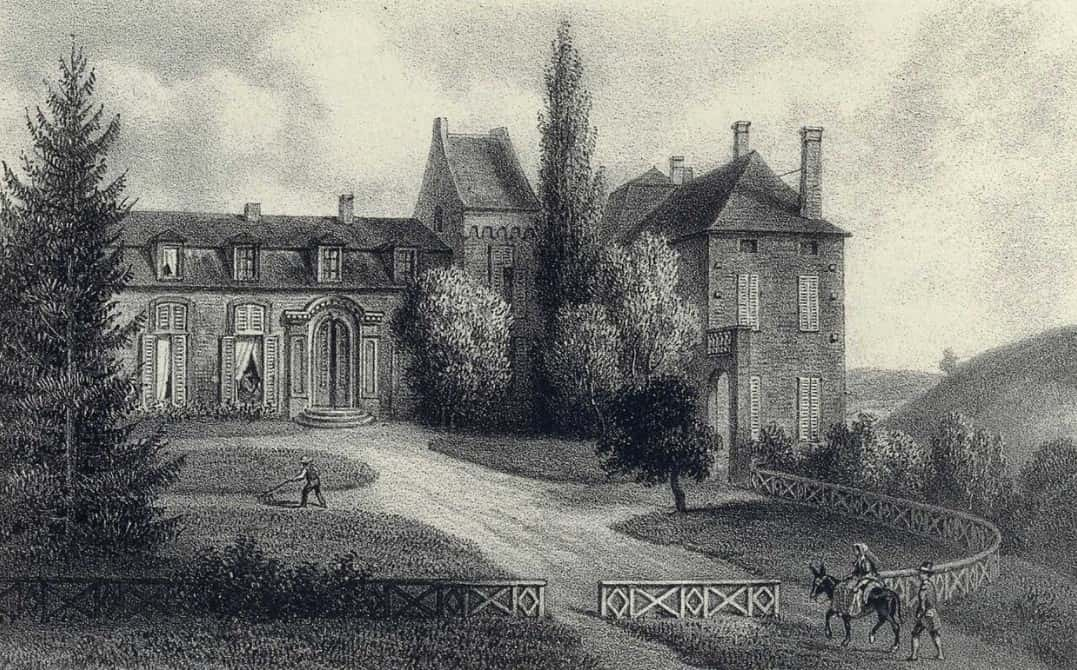 Wikipedia
Wikipedia
18. It’s Not A Love Story Without A Sad Ending
In 1748, Émilie du Châtelet began another affair with a young poet, who impregnated her. Sadly, he abandoned du Châtelet the following year before the child was born. In her desperation, du Châtelet turned to Voltaire for help, and he even managed to get her former husband to return to her. Despite this effort to disguise her baby as legitimate, Émilie du Châtelet would die in childbirth, along with her newborn daughter. It’s often been described as one of the great tragedies in Voltaire’s life.
19. A Jack Of All Trades
In the 1770s, Voltaire was still living in voluntary exile in Switzerland after his writing had made him too many enemies inside France. Since he was living in Switzerland anyway, he went into the watchmaking business with a group of Swiss businessmen. Not only was the business successful, but their watches “came to rival some of the best in Europe". Because he hadn't done enough already!
20. Hare Krishna
Strangely, based on his views of Islam and Judaism, Voltaire had a very positive view of Hindusm. On the subject of the Vedas, sacred texts in the Hindu religion, Voltaire wrote that they were “the most precious gift for which the West had ever been indebted to the East". Voltaire, famous for his vegetarianism and support of animal rights, used the Hindu’s treatment of animals as a contrast to the classically Christian and European view of how animals fit into the grand scheme of things.
21. Man's Inhumanity To Man
In Voltaire’s well-known Candide, the novel’s protagonist meets a mutilated slave in French Guiana and is horrified to discover “at what price we eat sugar in Europe,” which has often been used to define Voltaire’s staunch opposition to the practice of slavery. As Voltaire wrote, the protagonist brings up the argument that if all humans are cousins, “no one could treat their relatives more horribly". Voltaire also endorsed other people’s anti-slavery stance, even when he hated any of their other views.
22. Returning Like A Rockstar
In 1778, Voltaire’s new play Irene was premiering in Paris. Voltaire returned to the city for the show and received a hero’s welcome. It’s said that 300 people visited him while he was in the city, and that’s before even mentioning the wild reception he got when he arrived at the theater.
23. A True Rebel
While Voltaire was in England, he was amazed at the “British liberties” which made for a more tolerant society. Ignoring the fact that the British had yet to give political rights to Jews or Catholics at this time, Voltaire promoted his admiration for the British way of doing things in 1734. Given that the British and the French had long been enemies of each other, Voltaire faced great opposition for these texts, but he published them without a permit (presumably while wearing a leather jacket and sunglasses). The response was predictable; the city of Paris witnessed public burnings of Voltaire’s texts, and he was forced to flee Paris for his life.
 Voltaire in Love (2021), France 2
Voltaire in Love (2021), France 2
24. Bow To The Master
Speaking of du Châtelet’s achievement of translating Principia Mathematica, Voltaire considered himself a devoted follower of Sir Isaac Newton. In fact, when he was given a copy of Newton’s aforementioned book, Voltaire was said to have knelt before it “as was only right". Talk about a diehard fan!
25. The Apple Of My Eye
Voltaire was actually one of the first men to promote Newton’s ideas and writing throughout France. While he didn’t invent the idea of Newton sitting under an apple tree and getting hit by falling fruit, his popularizing of the story is arguably the reason why it’s stuck around all these years.
26. Her Royal Highness
One of the most extensive (and personal) correspondences which Voltaire ever carried out was with Catherine the Great, the Empress of Russia. Voltaire was said to have hung a portrait of Catherine over his bed, and even praised her autocratic rule over Russia. For her part, Catherine was fascinated by the Enlightenment and spent eleven years writing at least twenty-six letters to Voltaire.
27. An Honored Guest
During his exile in England, Voltaire mostly spent his time in London, and his tendency to have friends in high places continued. Among the many people that Voltaire is said to have interacted with include Alexander Pope, Sarah, Duchess of Marlborough, John Gay, and Jonathan Swift. He also rubbed shoulders with members of the English aristocracy and royalty before his exile ended.
28. Did They Also Go Kite-Flying?
One of the other well-known minds of the Enlightenment was the American known as Benjamin Franklin. Franklin and Voltaire had respect for the other, and in 1776, when Franklin served as the American ambassador to France, he met with the elderly Voltaire. The meeting was so successful that Voltaire was persuaded by Franklin to join the secret society known as the Freemasons.
29. Master Of The House, Doling Out The Charm…
As Voltaire’s popularity skyrocketed over the course of his life, his estate became known by many as a necessary place to visit when traveling to France. Many of all classes and occupations visited Voltaire at his home to pay their respects. This led Voltaire to being nicknamed “The Inn-Keeper of Europe". We can only hope that he was a better landlord than Monsieur Thenardier!
30. Oh, That Nasty Duc
In one of the first instances where Voltaire’s writing got him into trouble, he made a mockery of the Duc D’Orleans. At this time, in 1717, the Duc was in charge of the French government on behalf of Louis XV, who was a very young child at the time. Voltaire began criticizing the government through his writing and eventually upped the ante to the point that he satirically accused the Duc of having an inappropriate relationship with his own daughter!
31. Can’t You Take A Joke?
It’s not surprising that the Duc D’Orleans, already angry about being criticized by Voltaire, was infuriated at the jape about his familial relations, whether it was meant humorously or not. However, the Duc showed his lack of a sense of humor by not only banishing Voltaire from Paris but sentencing him to be imprisoned in the Bastille for eleven months.
32. Family First?
For a man who got a kick out of claiming that the Duc was sleeping with his own daughter, Voltaire himself wasn’t above less-than-platonic love within his own family. In several letters to his widowed niece, Marie Louise Denis, Voltaire expressed a desire for her which went far beyond what society would find approving in an uncle. And before you insist that it’s only our society which frowns on such a relationship, Voltaire famously wrote those letters to his niece in Italian rather than French so that the servants wouldn’t be able to discover the meaning of his letters.
33. Two Peas In A Pod
Interestingly, we have no evidence that Voltaire’s niece did anything but reciprocate her uncle’s feelings. Admittedly, there’s no proof that their relationship was ever physically intimate, but we do know that Mary Louise Denis maintained this correspondence with Voltaire for years, and she even moved in to live with him as his companion and housekeeper.
34. Foster Father
Though Voltaire never had any children of his own, he and his niece did adopt a young woman named Marie-Francoise Corneille in 1760. Voltaire would go on to pay the dowry for Corneille’s marriage.
35. Hypocrite…
Despite Voltaire’s supposed stance on religious tolerance, he has become notorious for his negative portrayal of certain religions. Besides his attacks on the Catholic Church, Voltaire also painted a rather ugly picture of the Jewish people, whom he described as “an ignorant and barbarous people". Voltaire also had extremely negative views of Islam, calling Mohammed a “sublime charlatan” in one of his articles.
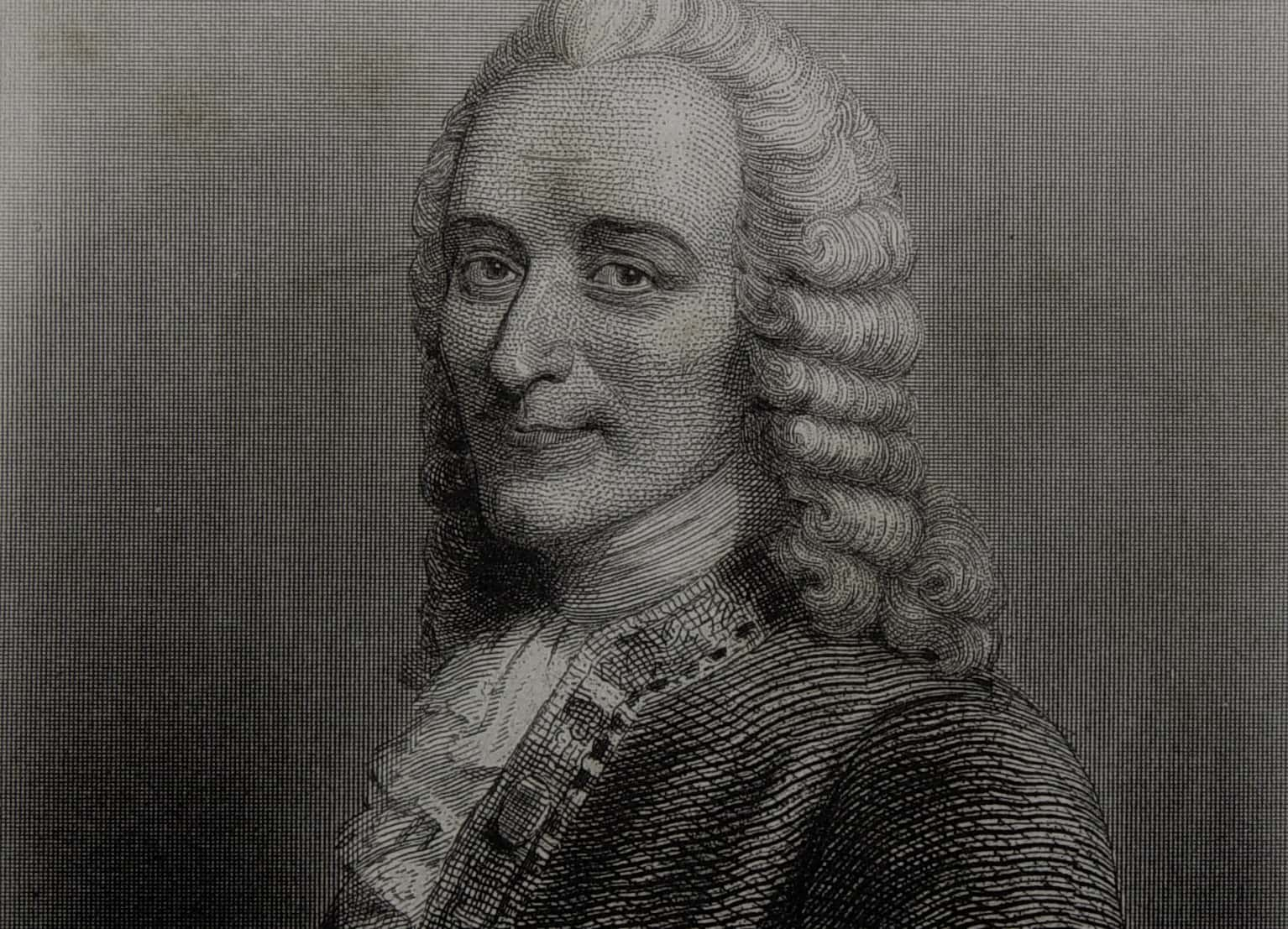 Flickr, Fondo Antiguo de la Biblioteca de la Universidad
Flickr, Fondo Antiguo de la Biblioteca de la Universidad
36. Not What You Thought
One of Voltaire’s most famous quotes is the statement “If God did not exist, it would be necessary to invent him". While this quote is often taken to be a cynical one, Voltaire used it in opposition to atheistic writers.
37. Words Will Never Hurt Me
One of the many people who was incensed by Voltaire was a guy named... Guy. Or, more specifically, Guy-Auguste de Rohan-Chabot, a nobleman who decided to pick a fight with the famously witty philosopher-writer. After mocking Voltaire in 1726 for taking on a fake name, Voltaire retorted that he was the first of his name, while Rohan-Chabot would be the last of his. Rohan-Chabot responded by ordering an attack and beating of Voltaire while he watched.
38. Fight Me If You Dare!
Faced with brutality for his (admittedly epic) insult, Voltaire took things further by challenging Rohan-Chabot to a duel. Like any bully, Rohan-Chabot was a coward and used his family connections to have Voltaire imprisoned. Voltaire managed to persuade the authorities to let him be exiled to England rather than prison. This was permitted, presumably because the officials figured that sending a Frenchman to live in England would be a far worse punishment than any prison could offer!
39. Misidentified Source
Unfortunately, contrary to popular belief, Voltaire was not behind the famous statement “I disapprove of what you say, but I will defend to the death your right to say it". Those words were written by Evelyn Beatrice Hall, under a pseudonym, in her biography of Voltaire.
40. I Wish I'd Thought Of That!
One of the most famous last words in history have been credited to Voltaire. When he was on his deathbed, and he was repeatedly asked to renounce the Devil, Voltaire is said to have joked “Now is not the time to make enemies!” before dying. Sadly, although it would have been totally in keeping with Voltaire’s flair for wit, the quote is apocryphal, and was only attributed to Voltaire in the 1970s.
41. Old Habits Die Hard
Voltaire finally passed on in 1778 at the ripe old age of 83 while he was visiting France to take part in the production of one of his plays. On his deathbed, he was approached multiple times by Catholic priests who were hoping to hear Voltaire give his confession and be reconciled with the Church before his passing. True to his beliefs, however, Voltaire refused to recant, even in the face of eternal damnation.
42. A Rebel In Death
This refusal to reconcile with the Catholic Church meant that Voltaire would be denied a Christian burial. However, his family and friends decided that it would only be proper if they carried on Voltaire’s defiance of the Catholic Church in his name. Voltaire was thus secretly buried in France’s Champagne region.


